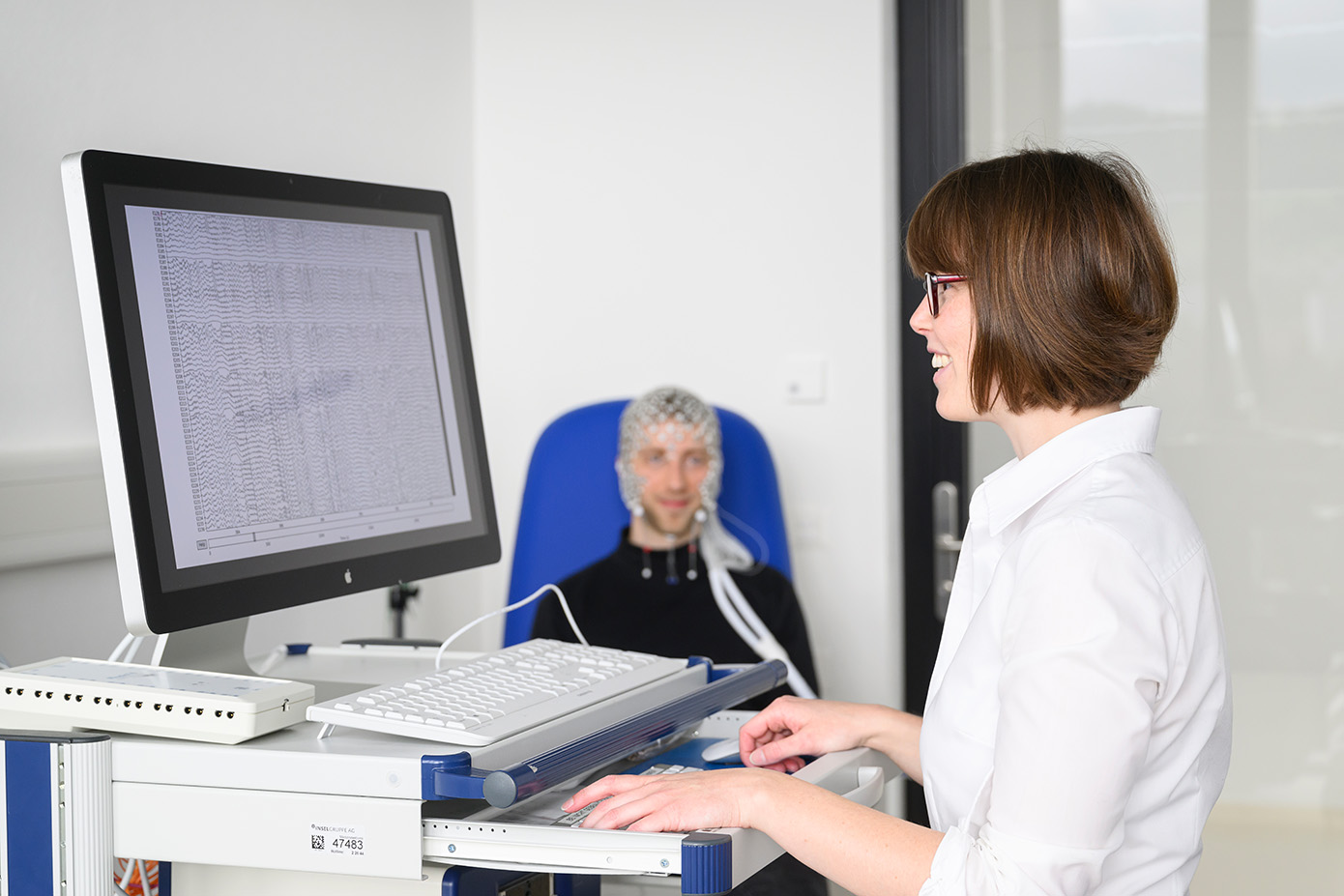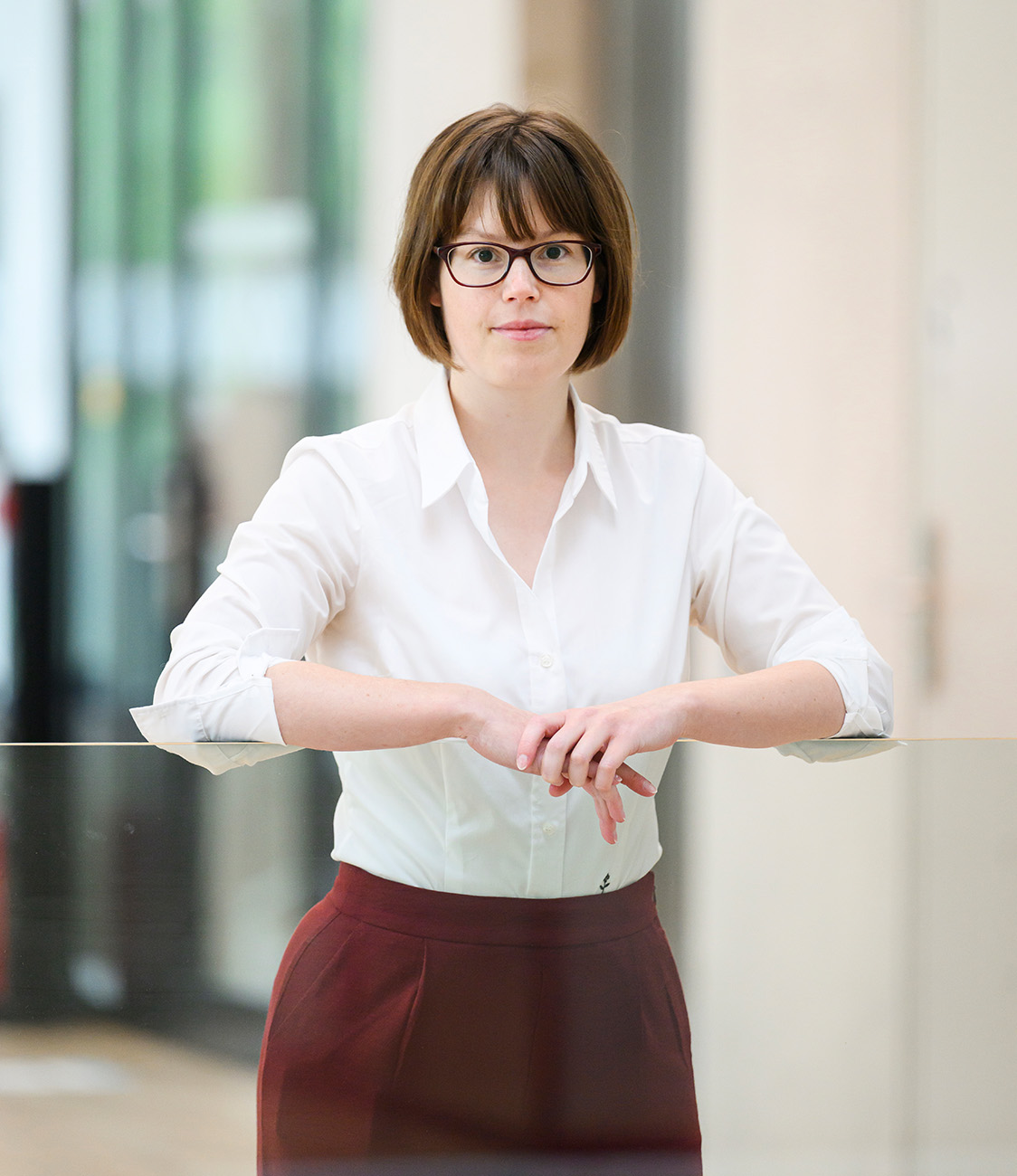"I find it exciting to create something new"
Florence Aellen is using her strong analytical background to develop a specific AI application for medicine with her UniBE Venture Fellowship. She is working on a software solution that helps clinicians to better assess the condition of patients in a coma.

Florence Aellen, what is your project about? My project predicts the chances of survival for comatose patients based on neural activity measured by electroencephalography (EEG). This information is extremely important for the treating clinicians and for families. During my doctoral thesis under the supervision of Prof Athina Tzovara, I worked on an AI algorithm that can reliably make such a prediction. The aim of the Venture Fellowship is now to integrate this algorithm into a software solution and bring it into hospitals.
What specific problem do you wish to solve? Clinicians today need different methods to determine the outcome of a coma. Some are based on EEG, others are not (for example pupillary reflexes). For EEG, the data is evaluated based on visual expertise: For example, a clinician observes the EEG and assesses, the effect of a clapping sound next to the patient on their brain activity. This procedure is not objective and is very time-consuming. In addition, the chances of survival are assessed via many different markers (factors). For some patients, no clear conclusions can be drawn because the results are contradictory. The algorithm I have developed, by contrast, is standardized and objective. And we were able to show that our system can make a very good prediction even in these currently unclear cases.
What added value does your innovation provide? Our project offers several advantages: It is very important for families to receive the most honest and realistic assessment possible of their loved one's chances of survival. For hospitals, it is also a matter of optimized planning. Coma patients need a lot of resources, and these are only maintained if the prognosis is good. Recent studies show that some coma patients who are still in a coma after three months can recover completely and without cognitive impairment at six months. Our system could potentially be used to identify those patients who need this additional time to recover. And that could save lives.
Which expertise do you bring to the project? I have a very theoretical background with mathematics (Bachelor) and theoretical physics (Master) and a PhD in computer science. During my PhD, I had a dual affiliation with the Institute of Computer Science at the University of Bern and the Center for Experimental Neurology at the Inselspital. This allows me to combine knowledge about the origin and nature of the neurological data as well as technical tools for analyzing it, such as artificial intelligence. These competences constitute the foundation of the project.
How do you get from theoretical physics to working on such an application? I really enjoyed theoretical physics! After my master’s degree, however, it was clear to me that I wanted to do something with a concrete application. I was interested in programing, and it was the time when AI was really taking off. When I saw the announcement for the PhD with AI and the application to EEG data, everything just clicked into place.
Can AI predictions be trusted? In our study, we show that we can provide very good predictions based on a large cohort with over 10 years of data. However, one should never trust an AI by itself. It acts more as a second opinion. Especially when it comes to such important health matters, the final say must always lie with a human with specialist expertise. With AI, we can extract more information from the data, visualize it better and speed up the whole process, but in the end the medical staff should decide. I believe in our application and see great potential to enable clinicians and families of coma patients to make better informed decisions and reduce emotional burden.

Florence Aellen is a member of the Cognitive Computational Neuroscience headed by Athina Tzovara and analyzes brain functions using AI.
What motivates you to become an entrepreneur? I find it exciting to create something new. It must be something that does good and brings new benefits to society. In this respect, I see myself as the CTO of a start-up. What also motivates me is to build and shape something from scratch. For example, being able to decide for myself what the values and structures are in a start-up and ultimately giving others the kind of work I would appreciate myself. I wish to create a stimulating working environment.
How does the UniBE Venture Fellowship come into play? Before the fellowship, my energy was heavily focused on research. Now I have the time to develop a software solution from our algorithm as a ‘minimal viable product’ - something you can show and take to potential users. It's also about finding out how well the product fits into the market. About questions such as: Can the existing problem be solved in this way? And how does the innovation reach the end users? I receive very good support from the Innovation Office in all my individual questions.
What are your personal challenges on the entrepreneurial path? I am a curious person and always interested in learning something new. During my career to date, I have never shied away from completely changing direction and exploring a different field. That took courage. Despite this confidence in myself, I find it challenging to come out of my shell and communicate my enthusiasm to others. I tend to be shy and am now trying to rise to this challenge. If you're not naturally outgoing, it takes time to feel comfortable approaching people. But I think the fellowship is a wonderful opportunity to grow in this area as well.
Venture Fellowship
The Venture Fellowship Program at the University of Bern
The Venture Fellowship Program at the University of Bern enables four young researchers each year to continue their translational research for one year. The program aims to assess the technical feasibility (Proof-of-Concept) of their projects and prepare for their subsequent commercialization. The Innovation Office at the University of Bern supports them with consulting, mentoring, and networking, in cooperation with be-advanced – the startup coaching platform of the Canton of Bern. The fellowships, each endowed with CHF 100’000, are jointly funded by the University of Bern, the ARTORG Center for Biomedical Engineering Research, and the Inselspital. In addition, the Swiss Federal Institute of Intellectual Property (IPI) supports the program with guided patent searches and patent landscape analyses. The next call for proposals will be published in September 2025.
